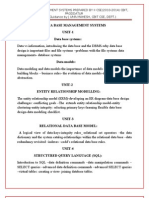0 ratings0% found this document useful (0 votes)
52 viewsIndex & Query Optimization
The document discusses different types of indexes and strategies for optimizing database queries. It defines indexes and indexing, describes primary, secondary and clustering indexes. It also provides examples of query optimization including using indexes to improve query efficiency and choosing efficient execution strategies.
Uploaded by
Ikawa AfueCopyright
© © All Rights Reserved
Available Formats
Download as PDF, TXT or read online on Scribd
0 ratings0% found this document useful (0 votes)
52 viewsIndex & Query Optimization
The document discusses different types of indexes and strategies for optimizing database queries. It defines indexes and indexing, describes primary, secondary and clustering indexes. It also provides examples of query optimization including using indexes to improve query efficiency and choosing efficient execution strategies.
Uploaded by
Ikawa AfueCopyright
© © All Rights Reserved
Available Formats
Download as PDF, TXT or read online on Scribd
You are on page 1/ 21
DBMS
Index and Query
Optimization
1
Index and Query
Optimization
Abel M. Ingaw
Ronald T. Bragas
Index: a data structure that improves the speed of
data retrieval operations
MySQL index: a separate file that is sorted, and
contains only the field/s a user is interested in
sorting on
Indexing: a data structure, which orders data of
one or more columns in database table
Definition of Terms
2
Index: a data structure that improves the speed of
data retrieval operations
MySQL index: a separate file that is sorted, and
contains only the field/s a user is interested in
sorting on
Indexing: a data structure, which orders data of
one or more columns in database table
defined based on its indexing attributes
can be one of the following types
Primary Index: If index is built on ordering
'key-field' of file
Secondary Index: If index is built on non-
ordering field of file
Clustering Index: If index is built on ordering
non-key field of file
Indexing
3
defined based on its indexing attributes
can be one of the following types
Primary Index: If index is built on ordering
'key-field' of file
Secondary Index: If index is built on non-
ordering field of file
Clustering Index: If index is built on ordering
non-key field of file
Dense Index: there is an index record for every
search key value in the database
Sparse Index: index records are not created
for every search key. An index record here
contains search key and actual pointer to the
data on the disk
Clustering Index: If index is built on ordering
non-key field of file
Ordered Indexing
4
Dense Index: there is an index record for every
search key value in the database
Sparse Index: index records are not created
for every search key. An index record here
contains search key and actual pointer to the
data on the disk
Clustering Index: If index is built on ordering
non-key field of file
Multilevel Index:
Index records are comprised of search-key
value and data pointers. This index itself is
stored on the disk along with the actual
database files.
Ordered Indexing
5
Multilevel Index:
Index records are comprised of search-key
value and data pointers. This index itself is
stored on the disk along with the actual
database files.
Query Optimization
Part 2
6
Query Optimization
Query:
is a request for information from a database
Query Optimization
7
Query:
is a request for information from a database
Activity of choosing an efficient
execution strategy for processing query
Query Optimization
8
Activity of choosing an efficient
execution strategy for processing query
Aims to choose a query which minimizes the usage
of resources
Reduces the total execution time of query
Helps to find the near optimum solution
Query Optimization
9
Aims to choose a query which minimizes the usage
of resources
Reduces the total execution time of query
Helps to find the near optimum solution
Scenario:
Table Name: employee
Columns:
employee_number, firstname, surname, address ,
tel_no varchar, salary,overtime_rate
Query Optimization
10
Scenario:
Table Name: employee
Columns:
employee_number, firstname, surname, address ,
tel_no varchar, salary,overtime_rate
Example 1:
Find employee Fred Jone's salary(employee number
101832)
SQL:
SELECT salary FROM employee WHERE
employee_number = '101832';
Query Optimization
11
Example 1:
Find employee Fred Jone's salary(employee number
101832)
SQL:
SELECT salary FROM employee WHERE
employee_number = '101832';
Problem:
No clue where to find this record
Solution:
SELECT employee_number, firstname, surname FROM
employee WHERE employee_number= '10875';
Query Optimization
12
Problem:
No clue where to find this record
Solution:
SELECT employee_number, firstname, surname FROM
employee WHERE employee_number= '10875';
Example 2:
What about if you want to select on more than one
criteria?
SQL 1:
SELECT firstname FROM employee
Query Optimization
13
Example 2:
What about if you want to select on more than one
criteria?
SQL 1:
SELECT firstname FROM employee
Problem:
makes no use of an index at all. An index on firstname
is useless
Solution:
SELECT firstname FROM employee WHERE
surname="Madida";
Query Optimization
14
Problem:
makes no use of an index at all. An index on firstname
is useless
Solution:
SELECT firstname FROM employee WHERE
surname="Madida";
Example 3:
find all the employees where half their overtime rate is
less than 20 pesos
SQL 1:
SELECT firstname FROM employee WHERE
overtime_rate<20*2;
Query Optimization
15
Example 3:
find all the employees where half their overtime rate is
less than 20 pesos
SQL 1:
SELECT firstname FROM employee WHERE
overtime_rate<20*2;
Problem:
Every single employee record is being read
School Algebra to the rescue:
x/2 = y' is the same as 'x = y*2
Query Optimization
16
Problem:
Every single employee record is being read
School Algebra to the rescue:
x/2 = y' is the same as 'x = y*2
Solution:
Add an index on overtime_rate
SELECT firstname FROM employee WHERE
overtime_rate/2<20;
Query Optimization
17
Solution:
Add an index on overtime_rate
SELECT firstname FROM employee WHERE
overtime_rate/2<20;
Example 4:
Having thousands of records, delete all records as fast
as possible.
SQL 1:
DELETE FROM employee
Query Optimization
18
Example 4:
Having thousands of records, delete all records as fast
as possible.
SQL 1:
DELETE FROM employee
Problem:
DELETE drops records one by one
Solution:
TRUNCATE TABLE employee
TRUNCATE employee
Query Optimization
19
Problem:
DELETE drops records one by one
Solution:
TRUNCATE TABLE employee
TRUNCATE employee
Conclusion
It's not only getting the data in that
needs to be quick - sometimes you
need to get it out quickly too
20
It's not only getting the data in that
needs to be quick - sometimes you
need to get it out quickly too
Any questions?
End of Topic
21
End of Topic
You might also like
- Database Management Systems Complete Notes100% (7)Database Management Systems Complete Notes181 pages
- Chinmoy Mukherjee - Cracking The Coding Interview - 70 Database Questions and Answers (2015)No ratings yetChinmoy Mukherjee - Cracking The Coding Interview - 70 Database Questions and Answers (2015)22 pages
- Index On The Search Key, and Heap Files With An Unclusted Hash Index. Briefly Discuss TheNo ratings yetIndex On The Search Key, and Heap Files With An Unclusted Hash Index. Briefly Discuss The5 pages
- How To Optimize Queries (Theory An Practice) : Cloud Computing Security 101: Learn How To Keep Your Users SafeNo ratings yetHow To Optimize Queries (Theory An Practice) : Cloud Computing Security 101: Learn How To Keep Your Users Safe15 pages
- Lecture 6 - Database Design Process PDFNo ratings yetLecture 6 - Database Design Process PDF19 pages
- IderaWP 7IndexingTipsToImproveSQLServerPerformance PDFNo ratings yetIderaWP 7IndexingTipsToImproveSQLServerPerformance PDF8 pages
- Querry Processing and Indexing, HashingNo ratings yetQuerry Processing and Indexing, Hashing24 pages
- Overview of Storage and Indexing: CSCD34 - Data Management Systems - A. Vaisman 1No ratings yetOverview of Storage and Indexing: CSCD34 - Data Management Systems - A. Vaisman 122 pages
- Ateeb Ul Haq Class XII Final Access PracticalNo ratings yetAteeb Ul Haq Class XII Final Access Practical16 pages
- Solution Manual for Illustrated Microsoft Office 365 and Access 2016 Intermediate 1st Edition Friedrichsen 1305877993 9781305877993 instant download100% (1)Solution Manual for Illustrated Microsoft Office 365 and Access 2016 Intermediate 1st Edition Friedrichsen 1305877993 9781305877993 instant download41 pages
- Edgewood Solutions Engineers: Written By: - 11/13/2008No ratings yetEdgewood Solutions Engineers: Written By: - 11/13/20086 pages
- Relational Database Model - Normalisation Part 1No ratings yetRelational Database Model - Normalisation Part 132 pages
- Database Optimization Interview: AnswerNo ratings yetDatabase Optimization Interview: Answer13 pages
- SQL Study Material -6 (Views, Indexes and CTEs) (4)No ratings yetSQL Study Material -6 (Views, Indexes and CTEs) (4)6 pages
- 12 sql query optimization best practices for cloud databasesNo ratings yet12 sql query optimization best practices for cloud databases9 pages
- Sqlfordevscom Next Level Database Techniques For Developers 37 40No ratings yetSqlfordevscom Next Level Database Techniques For Developers 37 404 pages
- Physical Database Design For Relational DatabasesNo ratings yetPhysical Database Design For Relational Databases37 pages
- Data Model: Bsit 2 / Prog Nciv 2 / BKK 2No ratings yetData Model: Bsit 2 / Prog Nciv 2 / BKK 223 pages
- Relationships: Bsit 2 / Prog Nciv 2 / BKK 2No ratings yetRelationships: Bsit 2 / Prog Nciv 2 / BKK 28 pages
- Assuming The Role of The Systems Analyst: Session1No ratings yetAssuming The Role of The Systems Analyst: Session112 pages
- 1 1.1 Purpose: Computer Audit & Security DCCP 2015No ratings yet1 1.1 Purpose: Computer Audit & Security DCCP 201513 pages
- Telephone Billing System Project AbstractNo ratings yetTelephone Billing System Project Abstract2 pages
- EUP1501 Assessment 2 (Sem 2 - 2024) - InstructionsNo ratings yetEUP1501 Assessment 2 (Sem 2 - 2024) - Instructions2 pages
- Maintenance Operating and Service ManualNo ratings yetMaintenance Operating and Service Manual16 pages
- Test Bank for Refrigeration and Air Conditioning Technology, 9th Edition, Eugene Silberstein, Jason Obrzut, John Tomczyk, Bill Whitman, Bill Johnson - Available For One-Click Instant Download100% (3)Test Bank for Refrigeration and Air Conditioning Technology, 9th Edition, Eugene Silberstein, Jason Obrzut, John Tomczyk, Bill Whitman, Bill Johnson - Available For One-Click Instant Download46 pages
- (Extended) Roll Me A Deity - by Assassin NPCNo ratings yet(Extended) Roll Me A Deity - by Assassin NPC35 pages
- Modeling and Analysis: Heuristic Search Methods and SimulationNo ratings yetModeling and Analysis: Heuristic Search Methods and Simulation16 pages
- Surface Area and Porosity Determinations by Physisorption: Measurement, Classical Theories and Quantum Theory 2Nd Edition James B. Condon - Ebook PDF100% (3)Surface Area and Porosity Determinations by Physisorption: Measurement, Classical Theories and Quantum Theory 2Nd Edition James B. Condon - Ebook PDF51 pages
- Chinmoy Mukherjee - Cracking The Coding Interview - 70 Database Questions and Answers (2015)Chinmoy Mukherjee - Cracking The Coding Interview - 70 Database Questions and Answers (2015)
- Index On The Search Key, and Heap Files With An Unclusted Hash Index. Briefly Discuss TheIndex On The Search Key, and Heap Files With An Unclusted Hash Index. Briefly Discuss The
- How To Optimize Queries (Theory An Practice) : Cloud Computing Security 101: Learn How To Keep Your Users SafeHow To Optimize Queries (Theory An Practice) : Cloud Computing Security 101: Learn How To Keep Your Users Safe
- IderaWP 7IndexingTipsToImproveSQLServerPerformance PDFIderaWP 7IndexingTipsToImproveSQLServerPerformance PDF
- Overview of Storage and Indexing: CSCD34 - Data Management Systems - A. Vaisman 1Overview of Storage and Indexing: CSCD34 - Data Management Systems - A. Vaisman 1
- Solution Manual for Illustrated Microsoft Office 365 and Access 2016 Intermediate 1st Edition Friedrichsen 1305877993 9781305877993 instant downloadSolution Manual for Illustrated Microsoft Office 365 and Access 2016 Intermediate 1st Edition Friedrichsen 1305877993 9781305877993 instant download
- Edgewood Solutions Engineers: Written By: - 11/13/2008Edgewood Solutions Engineers: Written By: - 11/13/2008
- SQL Study Material -6 (Views, Indexes and CTEs) (4)SQL Study Material -6 (Views, Indexes and CTEs) (4)
- 12 sql query optimization best practices for cloud databases12 sql query optimization best practices for cloud databases
- Sqlfordevscom Next Level Database Techniques For Developers 37 40Sqlfordevscom Next Level Database Techniques For Developers 37 40
- Oracle Quick Guides: Part 2 - Oracle Database DesignFrom EverandOracle Quick Guides: Part 2 - Oracle Database Design
- SAS Interview Questions You'll Most Likely Be AskedFrom EverandSAS Interview Questions You'll Most Likely Be Asked
- Assuming The Role of The Systems Analyst: Session1Assuming The Role of The Systems Analyst: Session1
- 1 1.1 Purpose: Computer Audit & Security DCCP 20151 1.1 Purpose: Computer Audit & Security DCCP 2015
- EUP1501 Assessment 2 (Sem 2 - 2024) - InstructionsEUP1501 Assessment 2 (Sem 2 - 2024) - Instructions
- Test Bank for Refrigeration and Air Conditioning Technology, 9th Edition, Eugene Silberstein, Jason Obrzut, John Tomczyk, Bill Whitman, Bill Johnson - Available For One-Click Instant DownloadTest Bank for Refrigeration and Air Conditioning Technology, 9th Edition, Eugene Silberstein, Jason Obrzut, John Tomczyk, Bill Whitman, Bill Johnson - Available For One-Click Instant Download
- Modeling and Analysis: Heuristic Search Methods and SimulationModeling and Analysis: Heuristic Search Methods and Simulation
- Surface Area and Porosity Determinations by Physisorption: Measurement, Classical Theories and Quantum Theory 2Nd Edition James B. Condon - Ebook PDFSurface Area and Porosity Determinations by Physisorption: Measurement, Classical Theories and Quantum Theory 2Nd Edition James B. Condon - Ebook PDF


































































































